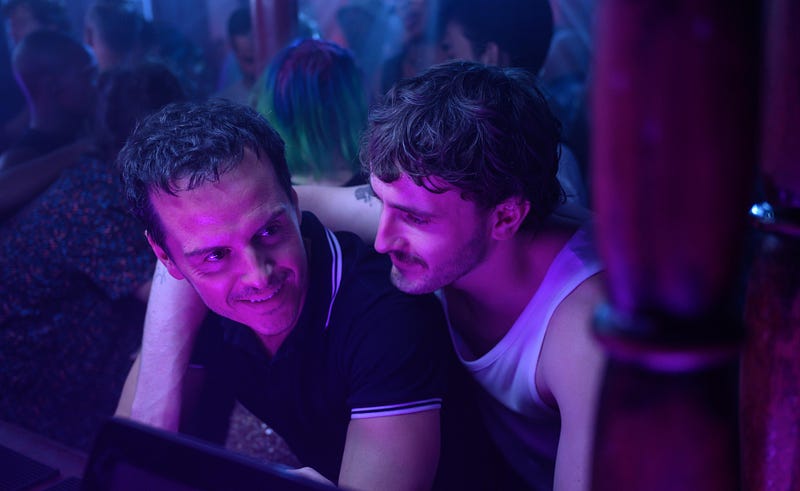Film Review — All of Us Strangers
Andrew Haigh’s superbly crafted, almost unbearably sad adaptation of Taichi Yamada’s novel features outstanding performances

Writer-director Andrew Haigh’s acclaimed, Oscar-snubbed but not BAFTA-snubbed new film All of Us Strangers is not the first time Taichi Yamada’s novel Strangers has been adapted for the screen. The Discarnates (1988) followed hot on the heels of the 1987 novel. Haigh’s version keeps the premise, and 1987 as a key element of the narrative, but makes several significant additions and tweaks, as well as relocating the story to present-day Britain.
The plot involves gay, lonely screenwriter Adam (Andrew Scott), who lives almost entirely alone in a newly built London block of flats. The only other occupant, Harry (Paul Mescal) is also gay, and more outgoing than Adam. Harry knocks on Adam’s door one evening, drunk and keen for a bit of company, but despite sparks of attraction, Adam initially rebuffs his advances, wishing to be alone. However, when they meet again, Adam reciprocates, and the two embark on a sexual relationship.
Amid all of this, whilst writing a screenplay inspired by his late parents, who died in a car crash when he was twelve, Adam visits his old family home. To his surprise, he finds his parents still living there, looking no older than they were in late 1987, before they died on New Year’s Eve. What is going on?
What follows is a visually compelling, gently supernatural, woozily melancholy drama, with universal resonance beyond its themes of sexuality. Yes, it’s about differences in British attitudes to homosexuality, in terms of how they are now compared with the late 1980s. Indeed, Harry and Adam engage in amusing debate about how the terms “gay” and “queer” have come to mean different things at different times, with them both being insulting at one point.
But this is merely the starting point for a drama that explores relatable-to-all themes of loneliness, grief, trauma, nostalgia, complex parental relationships, coming to terms with the past, and the danger of not moving on from it. Above all, this is a story about love — not just romantic love, but most emphatically, the need for parental love and acceptance, and how its presence (or lack thereof) shapes and forms who we become. Anyone who has lost a parent will have their heartstrings tugged by the scenes with Adam and his family, to put it mildly.
Andrew Scott and Paul Mescal are both wonderful, as are Claire Foy and Jamie Bell as the parents. Haigh’s direction is brilliant, at once rooted in gritty realism, but with a magical realist sprinkling of the fantastic, occasionally disorienting the viewer, sometimes making us question what is real, in this most unusual of ghost stories. Yet the story consistently surprises. An M Night Shyamalan-ish finale may have felt tacked on and foolish in lesser hands, but here it works as a deft ending flourish, lingering long in the memory after the end credits.
In addition to a fine music score by Emilie Levienaise-Farrouch, the use of pop songs in this film is particularly inspired. Johnny Come Home by Fine Young Cannibals, Is This Love? by Alison Moyet, Death of a Party by Blur, and especially The Power of Love by Frankie Goes To Hollywood serve as important commentary on the narrative. They aren’t present for mere nostalgia, but to illustrate Adam’s inability to move on. He’s often watching old episodes of Top of the Pops, for instance.
Most emphatically of all, Always on My Mind by Pet Shop Boys, one of my all-time favourite singles, is used to astonishing effect in one scene involving Adam and his family decorating a Christmas tree, circa Christmas 1987 (when the song was number one in the UK charts, as we see from the Top of the Pops clip playing in the background). This moment of vital catharsis between Adam and his mother, in which she joins in the singing, and the lyrics take on a profound new resonance, reminded me of a similarly intensely moving moment in Aftersun (2022), involving Queen and David Bowie’s Under Pressure. Both scenes left me in floods of tears.
This won’t be for everyone, but all things considered, All of Us Strangers is a beautifully crafted, haunting piece of cinema, shot through with poignancy and compassion, even if it is almost unbearably sad. If that sounds like your cup of tea, do go and see it. But bring tissues.
The Dillon Empire beyond Medium


